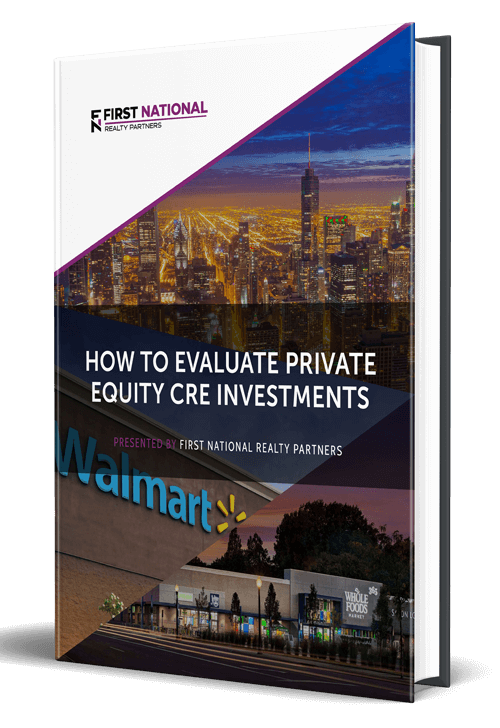For commercial real estate investors, there are two popular tax deferral options, 1031 Exchanges and Delaware Statutory Trusts (DST). While these two structures provide a similar outcome, they are very different and should be evaluated as such.
In this article, we are going to define 1031 Exchanges and DSTs and highlight their similarities and differences. By the end, readers will be able to identify key differences between these two structures and choose the one that is the best fit for their own individual needs.
At First National Realty Partners, we specialize in the acquisition and management of grocery store anchored retail centers. As part of our day to day business, we routinely work with investors to help place their 1031 Exchange funds. If you are an accredited investor and would like to learn more about our current opportunities, click here.
1031 Exchanges and DSTs Explained
When a real estate investor sells a property for a price that is higher than their cost basis, they realize a “gain on sale” and it is taxable. Depending on the individual’s tax bracket and how long the property was held for, IRS rules dictate that the capital gains tax rate can be as high as 25%. So, on a $1,000,000 gain, the tax bill could be as high as $250,0000, which can put a significant dent in both profits and returns. Fortunately, there are two ways that investors could potentially defer this tax bill, with a 1031 Exchange and/or through an investment in a Delaware Statutory Trust.
1031 Exchanges
A 1031 Exchange is a type of real estate transaction that allows investors to defer capital gains taxes on the profitable sale of an investment property as long as they reinvest the sales proceeds into another property that is “like kind” to the one that was sold. In general, most commercial properties are like kind to other commercial properties. For example, an investor would be allowed to exchange a retail property for a multifamily apartment building or an office building for an industrial property.
1031 Exchange rules state that investors have 45 days from the sale date of the relinquished property to identify a suitable replacement property and 180 days to close on the purchase of it. Given the relatively tight timeframe, it is common for investors to struggle to find a property they like and are happy with. This is where a DST investment comes into the picture.
What is a Delaware Statutory Trust?
A Delaware Statutory Trust is a legal structure that allows individual investors to purchase a fractional interest in an institutional quality commercial asset. Technically, they are trusts, formed under Delaware law for the purpose of conducting businesses.
Any accredited investor can make a real estate investment in a Delaware Statutory Trust or DST Offering, and they may not necessarily do so in an effort to defer capital gains taxes, but there is one specific circumstance where a DST investment can be used in conjunction with a 1031 Exchange to do so.
What is a DST 1031 Exchange?
IRS Revenue Ruling 2004-86 states that a DST investment is allowable as a replacement property in a 1031 Exchange.
So, in a DST 1031 Exchange, the investor would sell their property like they normally would, but instead of buying a new property on their own, they would place their exchange proceeds into a DST investment that gives them fractional ownership of a large commercial asset. In return for their ownership interest, DST investors get their pro rata share – in the form of distributions – of the profits and cash flow produced by the underlying property.
Purpose of 1031 Exchange DSTs
DST investments are widely available through reputable sponsors. In addition, they can be closed quickly and used to diversify an investor’s portfolio. For this reason, investors like them as a replacement property in a 1031 Exchange for three reasons:
- Because they can be closed quickly, they can remove the stress of finding a full replacement property within the allowable time frame (45 days)
- Because they have relatively low minimum investment amounts, investors can choose multiple DST investments to diversify their portfolio by property type, location, or asset class
- Typically, DST property management is handled by a professional, third party firm which makes this a passive investment for individuals who invest in this structure.
For these reasons, and others, using the DST structure as a replacement property in a 1031 Exchange is a popular and common way for investors to defer capital gains taxes on the profitable sale of a property.
Basic Structure of a 1031 Exchange DST
Legally, a DST is a specialized type of trust that is formed for the purpose of conducting business. They are formed with private trust agreements under which real property is “…held, managed, administered, invested, and/or operated.”
Structurally, there are two groups of investors involved in a DST investment. The first is the deal sponsor, also sometimes referred to as the General Partner, whose job it is to find, finance, and manage the asset for the entirety of the planned holding period. For their work, the sponsor charges some amount of fees in addition to sharing in the profitability of the investment.
The other group is the individual investors, sometimes called Limited Partners. Their role is to provide investment capital to help close on the purchase of the property, but they have no say in the day to day management decisions for the property. As a result of their fractional share of ownership, they collect their pro rata share of the income and profits produced by the asset.
Investing in 1031 Exchange DST Properties
DST investments are widely available from reputable sponsors and for relatively small minimum investment amounts. When performing due diligence on opportunities, investors should focus on three key aspects of the offering:
- The Sponsor: The sponsor should be experienced with a long track record of delivering stable returns to their investors. Information about their experience and reputation can be obtained from internet searches and the disclosures provided prior to investment.
- The Property: Every investor’s goals are different, but the property type should align with the individual strategy of each investor. In addition, the property should be in a good location, with good tenants, and strong cash flow. These aspects will help reduce risk in the investment.
- Fees: Finally, sponsors charge fees for facilitating the private placement of funds and managing the asset once purchased. These fees should be routine and customary and not a source of profit. Investors should compare fee structures relative to historical returns to find the right fit for their needs.
Once invested, there are a number of pros and cons that investors can expect from a DST offering.
Benefits of DST Exchanges
Aside from the benefits highlighted above, there are a number of key benefits to using a DST as a replacement property in a 1031 Exchange:
- Diversification: DSTs have relatively low minimum investment requirements, which means that 1031 Exchange taxpayers could place their funds in more than one opportunity, helping to diversify their portfolio. Of course, they should work with their CPA, tax professional, or Qualified Intermediary to ensure that all internal revenue code rules are followed in the placement of funds.
- Estate Planning: DST rules allow investors to identify heirs who can inherit the investment at a stepped up cost basis, which can make them a useful tool for estate planning purposes.
- Tax Advantages: In addition to the deferral of capital gains taxes, a DST investment comes with certain tax advantages, namely in the form of depreciation which serves to lower an investor’s income tax burden for each year in the holding period.
While these benefits can be significant, they should be weighed against the potential downsides.
Potential Risks of DST Exchanges
There are several risks that DST investors should be aware of. The three most notable include:
- Liquidity: A DST investment is illiquid and often requires that investors commit to it for five to ten years. If, during this time, an investor has to sell their shares, they are often forced to do so at a significant discount, which can lead to losses.
- Control: Again, investors have no operational control over the property and no say in management decisions. These are left entirely up to the sponsor, which underscores the need to perform detailed due diligence on them and their investment strategy.
- Availability: Generally, DST interests are available to accredited investors only, meaning individuals who meet certain income and/or net worth requirements. For this reason, they are not available to all, which gives them limited utility.
It is up to each individual investor to compare the benefits and risks of a DST investment to determine if they are a good fit for their own goals and strategy.
How 1031 DST Exchanges Interact with Real Estate Syndications
A 1031 DST Exchange is a type of syndication in the sense that a separate legal entity is formed for the purpose of purchasing a property and there are dozens or hundreds of investors who contribute capital with the hope of earning passive income.
So, a 1031 DST Exchange does not “interact” with a syndication, rather it is a type of syndication that is commonly offered by real estate firms.
Summary of 1031 Exchange DSTs
A 1031 Exchange is a type of commercial real estate transaction that allows investors to defer capital gains taxes on the profitable sale of an investment property as long as the sale proceeds are reinvested into a like kind property.
Often, finding a like kind replacement property within the allowable time frame can be a challenge. As an alternative, investors can place their sale proceeds into a Delaware Statutory Trust investment.
A Delaware Statutory Trust is a special type of trust that is formed under Delaware law for the purpose of conducting business. An IRS revenue ruling qualifies them as a suitable replacement property in a 1031 Exchange.
For investors, the benefits of using a DST as a replacement property in a 1031 Exchange include passive income, diversification, and the ability to defer capital gains taxes. Potential downsides include illiquidity and fees.
To determine if a DST investment is the right fit as a replacement property in a like kind exchange, investors should work with their CPA and/or tax professional.
Interested In Learning More?
First National Realty Partners is one of the country’s leading private equity commercial real estate investment firms. We leverage our decades of expertise and available liquidity to find world-class, multi-tenanted assets below intrinsic value. In doing so, we seek to create superior long-term, risk-adjusted returns for our investors while creating strong economic assets for the communities we invest in.
If you are an Accredited Investor and want to learn more about our investment opportunities, contact us at (800) 605-4966 or info@fnrpusa.com for more information.






